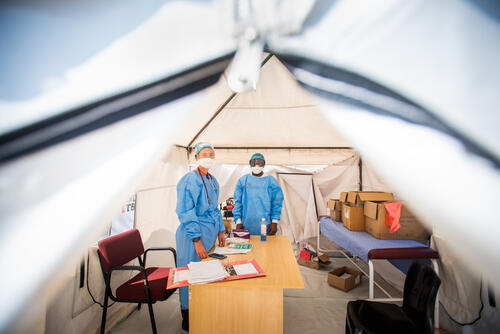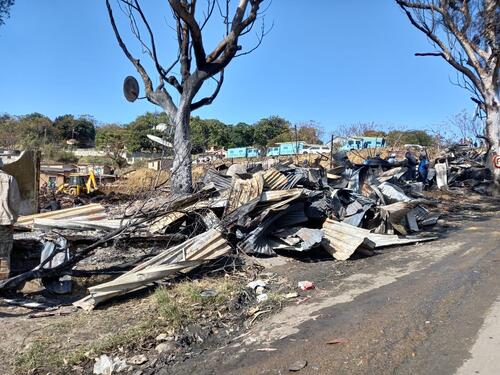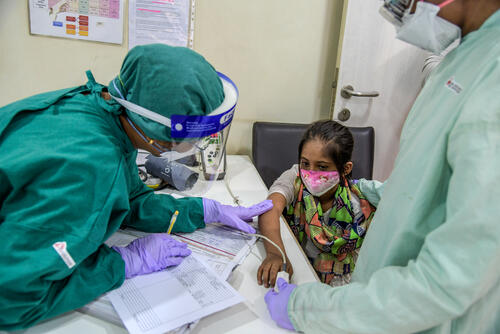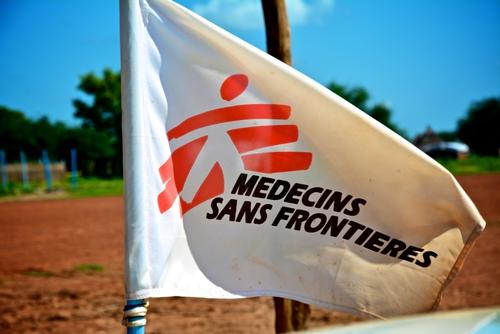- A new, highly infectious variant of the coronavirus, discovered in South Africa, is straining healthcare systems in the region and putting frontline medical staff at risk.
- Meanwhile, indications are that some COVID-19 vaccines are less effective against this new strain – while rich countries continue to hoard vaccines that would be more effective.
- MSF urges wealthy countries and pharma companies to immediately equitably distribute the right vaccines, at the right price, to low- and middle-income countries.
JOHANNESBURG – As COVID-19 continues to sweep across Southern and Sub-Saharan Africa, aggravated by a highly infectious variant of the virus in strained, fragile healthcare systems, equitable access and distribution of vaccines is more critical now than ever.
With the latest initial data indicating that some COVID-19 vaccines may be less effective than others against the 501Y.V2 variant first discovered in South Africa*, Médecins Sans Frontières (MSF) is calling on wealthy countries and pharmaceutical corporations for solutions that will urgently ensure that all countries can access effective vaccines quickly and affordably – before it is too late.
Truly equitable vaccine allocation and distribution should mean that countries are able to acquire not just any vaccines but the right vaccines... at the right time and at the right price.Dr Tom Ellman, Director of MSF’s Southern Africa Medical Unit
“The emergence of new COVID-19 variants should be a major consideration in determining the allocation of vaccines to countries around the world,” says Dr Tom Ellman, Director of MSF’s Southern Africa Medical Unit. “We have already seen South Africa forced to halt and adapt its planned vaccine rollout of one particular vaccine due to findings indicating decreased efficacy against the dominant 501Y.V2 variant.”
“Truly equitable vaccine allocation and distribution should mean that countries are able to acquire not just any vaccines but the right vaccines - adapted to the presence of new variants and to contextual factors - at the right time and at the right price,” continues Dr Ellman. “Unless the leaders of wealthy states and pharmaceutical corporations support this, and quickly, we risk generating new pandemics of vaccine-resistant COVID-19. Travel bans will not stop this, but equity and solidarity might.”
After a scramble last week, South Africa acquired a different trial vaccine to ensure its most-at-risk frontline healthcare workers get protection in a limited rollout as part of an implementation study, starting this week. However, it is clear that accessing vaccines for low- and middle-income countries will remain a serious problem unless systemic issues linked to protectionist agreements between wealthy nations and pharma corporations are dealt with. South Africa is now offering to share its initial unused vaccine consignment with the African Union for use in appropriate countries where the 501Y.V2 variant is not predominant.
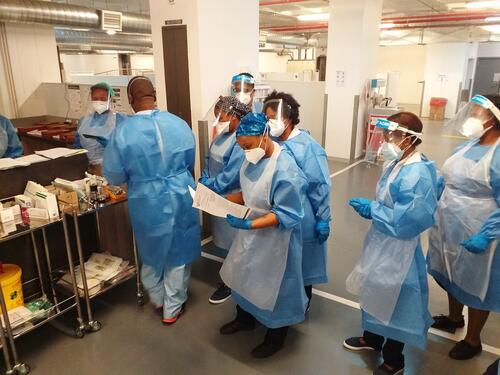
To date, more than 174 million people globally have been vaccinated, but almost none of these have been in Africa. Moreover, many wealthy countries have ordered two to three times as many vaccines as are actually required by their populations, and some are even set to receive vaccines from the COVAX facilityCOVID-19 Vaccines Global Access, abbreviated as COVAX, is a global initiative aimed at equitable access to COVID-19 vaccines led by the GAVI, the World Health Organization, the Coalition for Epidemic Preparedness Innovations, and others., which many developing countries exclusively rely on for vaccine access.
Aggravating the situation, these same countries, that have already vaccinated many of their healthcare workers, have for months blocked efforts led by South Africa and India to waive intellectual property protections on COVID-19 medical products, including vaccines, at the World Trade Organization (WTO). This move could enable low- and middle-income countries to produce or access these products more affordably through technology transfers, increased local manufacturing and price competition in the medium term.
“What we are witnessing right now is an unacceptable failure of humanity and the global response,” says Claire Waterhouse, MSF’s Regional Advocacy Coordinator. “We denounce countries that hoard vaccines and who have started to immunise low-risk groups, since it comes at the expense of countries who haven’t even started vaccinating frontline healthcare workers in health facilities already stretched to breaking point.”
MSF teams have been providing COVID-19 treatment and prevention in different communities throughout Southern Africa – in Eswatini, Malawi, Mozambique, South Africa, and Zimbabwe – since the beginning of the pandemic. Following the festive holiday season, the region was shaken by a sudden ‘second wave’ of COVID-19 infections. Several Southern African countries recorded more new COVID-19 cases in the month of January 2021 alone, than in all of 2020.
What we are witnessing right now is an unacceptable failure of humanity and the global response. We denounce countries that hoard vaccines and who have started to immunise low-risk groups.Claire Waterhouse, MSF Regional Advocacy Coordinator
“MSF staff have witnessed the severe impact of the ‘second wave’ on this region, its people and its health systems, which struggled to cope with the sudden onslaught of patients,” says Philip Aruna, MSF’s Regional Operations Manager in Southern Africa. “In South Africa, there weren’t enough healthcare workers in many of the hotspots and hospitals struggled to meet the demands for care.”
“While the wave of new infections is starting to slow in some of these countries, we are now preparing for the possibility of future surges of COVID-19 infections as the virus continues to adapt and spread,” Aruna continues. “A quick rollout of the most-effective-in-context vaccines would have a significant impact on reducing future infections and deaths among healthcare workers and most at-risk-groups. However, most countries in Southern Africa, and indeed the developing world, have yet to receive the quantities of vaccines they need.”
The system of access to medicines and vaccines needs to change at all levels. The solution to get ahead of the global danger of COVID-19 is for the leaders of states and pharmaceutical corporations to act urgently on the fact that, until everyone has access to the right vaccines for their reality, all countries will pay the price:
- MSF urges governments of wealthy nations that have immunised their frontline healthcare workers and high-risk groups to now help low- and middle-income countries by sharing their supplies with COVAX.
- Additionally, we urge pharmaceutical corporation leaders to pause or stop bilateral agreements that would over-supply wealthy nations hoarding vaccines, in order to prioritise the supply of vaccines to the COVAX facility or bilateral deals for countries yet to vaccinate their healthcare workers and high-risk groups.
- MSF calls on COVAX leaders, GAVI - the Vaccine Alliance, the Coalition for Epidemic Preparedness Innovations, the World Health Organization and donor states, to take immediate steps for speedy transparency on COVAX supply schedules, so that low- and middle-income countries know price, quantities and delivery date of vaccines they will receive.
They must act now. Every day COVID-19 vaccines are delayed is another day that healthcare workers in southern Africa and developing countries remain at great risk .Claire Waterhouse, MSF Regional Advocacy Coordinator
“While the COVAX mechanism is designed specifically for equitable distribution and vaccine development, it has yet to deliver a single vaccine to a country,” says Waterhouse. “COVAX lacks crucial transparency toward participating countries. It is clear that the global vaccine access system is inherently flawed, and we urge GAVI and donors to COVAX to acknowledge this and take steps to address this.”
“They must act now. Every day COVID-19 vaccines are delayed is another day that healthcare workers in southern Africa and developing countries remain at great risk while they continue to care for the sick,” concludes Waterhouse.
*The WHO’s Strategic Advisory Group of Experts on Immunization (SAGE) has issued guidance on using the Oxford/AstraZeneca vaccine for healthcare workers at high risk of exposure and people older than 65 years in countries where different variants of COVID-19 are present. This is despite early trial data released on the vaccine indicating reduced efficacy against the 501Y.V2 variant in preventing mild and moderate COVID-19 disease.
Notes
The bulk of the COVAX stockpile consists of the Oxford/AstraZeneca vaccine.
Some countries are considering their immunisation rollout plans given South Africa’s decision to halt the usage of the Oxford/AstraZeneca vaccine due to the data on reduced efficacy and is now rolling out the Johnson & Johnson vaccine to immunise its healthcare workers, in a limited fashion through an implementation study. South Africa started the rollout of 80,000 doses this week and will later add another 500,000 doses as part of a study.
Zimbabwe this week also took delivery of 200,000 doses of the Sinopharm vaccine to immunise healthcare workers and at-risk groups with the intention to acquire more doses later.



